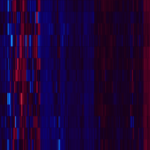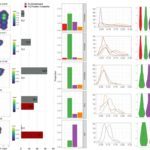Lien vers Pubmed [PMID] – 33688012
Lien DOI – e03549-2010.1128/mBio.03549-20
mBio 2021 Mar; 12(2):
Queuosine is a naturally occurring modified ribonucleoside found in the first position of the anticodon of the transfer RNAs for Asp, Asn, His, and Tyr. Eukaryotes lack pathways to synthesize queuine, the nucleobase precursor to queuosine, and must obtain it from diet or gut microbiota. Here, we describe the effects of queuine on the physiology of the eukaryotic parasite Entamoeba histolytica, the causative agent of amebic dysentery. Queuine is efficiently incorporated into E. histolytica tRNAs by a tRNA-guanine transglycosylase (EhTGT) and this incorporation stimulates the methylation of C38 in [Formula: see text] Queuine protects the parasite against oxidative stress (OS) and antagonizes the negative effect that oxidation has on translation by inducing the expression of genes involved in the OS response, such as heat shock protein 70 (Hsp70), antioxidant enzymes, and enzymes involved in DNA repair. On the other hand, queuine impairs E. histolytica virulence by downregulating the expression of genes previously associated with virulence, including cysteine proteases, cytoskeletal proteins, and small GTPases. Silencing of EhTGT prevents incorporation of queuine into tRNAs and strongly impairs methylation of C38 in [Formula: see text], parasite growth, resistance to OS, and cytopathic activity. Overall, our data reveal that queuine plays a dual role in promoting OS resistance and reducing parasite virulence.IMPORTANCEEntamoeba histolytica is a unicellular parasite that causes amebiasis. The parasite resides in the colon and feeds on the colonic microbiota. The gut flora is implicated in the onset of symptomatic amebiasis due to alterations in the composition of bacteria. These bacteria modulate the physiology of the parasite and affect the virulence of the parasite through unknown mechanisms. Queuine, a modified nucleobase of queuosine, is exclusively produced by the gut bacteria and leads to tRNA modification at the anticodon loops of specific tRNAs. We found that queuine induces mild oxidative stress resistance in the parasite and attenuates its virulence. Our study highlights the importance of bacterially derived products in shaping the physiology of the parasite. The fact that queuine inhibits the virulence of E. histolytica may lead to new strategies for preventing and/or treating amebiasis by providing to the host queuine directly or via probiotics.







